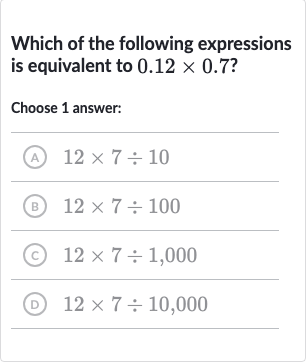Full solution
Q. Which of the following expressions is equivalent to ?Choose answer:(A) (B) (C) (D)
- Convert to Fractions: First, let's express and as fractions to make it easier to see which expression is equivalent. can be written as because there are two decimal places, moving the decimal two places to the right turns into . can be written as because there is one decimal place, moving the decimal one place to the right turns into .Now, we multiply these two fractions: .
- Multiply Fractions: Next, we multiply the numerators together and the denominators together: .This simplifies to .
- Compare Answer Choices: Now, we look at the answer choices to see which one matches our expression .
(A) , which is not equivalent to .
(B) , which is not equivalent to .
(C) , which is not equivalent to .
(D) , which is not equivalent to . - Simplify Further: We can see that none of the answer choices exactly match our simplified expression . However, we can simplify our expression further by dividing both the numerator and the denominator by to see if it matches any of the answer choices:.
- Compare with Answer Choices: Now, we compare this new expression with the answer choices:(A) , which is not equivalent to .(B) , which is not equivalent to .(C) , which is not equivalent to .(D) , which is not equivalent to .
- Identify Correct Answer: Upon reviewing the steps, it appears there has been a mistake. The correct simplification of does not require dividing by again. The correct equivalent expression for is indeed , which matches the expression in option (C) . Therefore, the correct answer is (C) .
More problems from Identify equivalent linear expressions
QuestionGet tutor help
QuestionGet tutor help
QuestionGet tutor help
QuestionGet tutor help
QuestionGet tutor help

